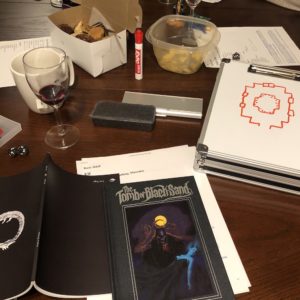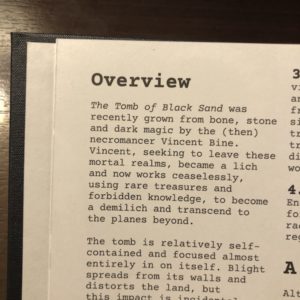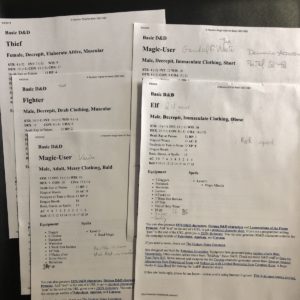I had the occasion to run a game for five players that, in addition to having never played a tabletop RPG before, barely knew about D&D at all. I ended up “running” 1981 B/X using Save vs. TPK pregens and The Tomb of Black Sand, with spells from Wonder & Wickedness—more on the scare quotes around “running” below. As it happened, I made the final decision about the ruleset and module about 15 minutes before leaving my apartment, and I have to say: OSR nerds, we have a grimdark problem. We have made strides toward more usable modules in terms of format, but perhaps there are more inviting introductions than reading out of a book called “Fever Swamp” for a casual Friday night game (great module, by the way).
There were five players, and from a stack of pregens they chose an elf, a fighter, two magic-users, and a thief. I explained the basic play loop—I describe the situation, you tell me what your character does, occasionally we roll dice to resolve an uncertainty—and the objective—recover as much treasure as possible without dying. A brief interchange was required to explain how the game was cooperative rather than competitive. Then I read a few sentences from the module about how Vincent Bine the necromancer was using foul magic in pursuit of immortality/ascension to set the stage and started the characters by the entryway of the dungeon, describing the blighted land around the heavy bronze doors.
The players fell quickly and naturally into heist mode, immediately treating the door as hostile ground, with the thief crouched above ready to drop down on any threat, the magic-users and elf arrayed firing-squad style behind the armored fighter, wands poised (because apparently all magic-users have wands, presumably Harry Potter style). Additionally, they immediately deployed ten foot poles to test for danger (be aware that 10”/10’ pole jokes are virtually unending with a table entirely composed of gay boys).
I scare quoted the word “running” above because, in terms of mechanics, the Moldvay book was little more than a prop (though a useful prop for communicating an aesthetic). The only rules that directly manifested during play were ability checks, spells, and thief abilities (which I ran as dexterity checks). Speaking of ability checks, the system I used for spell casting was unlimited spells, but to cast a spell without complication required passing an intelligence check. On failure, the intended spell still fired, but also came with a roll on the Wonder & Wickedness catastrophe table. I find this works well for a one-shot game because it pushes players out of the hoarding mindset that comes with having limited spell slots and also provides the temptation of a variable reinforcement schedule. After ability checks, the mechanic that saw the most table time was the output from the random appearance generator, which is built into Ram’s generator and is an amazingly useful tool for giving players some details to riff on. Bald magician, badly-dressed muscular fighter, and obese elf are immediately more engaging characters than a collection of abilities, and more immediately available than background details (failed careers are good prompts as well, but also have less immediacy).
Following successful entrance, there was some anxiety about the seeming shift in the room size, along with back and forth about whether to explore side chambers or go deeper right away (the initial determination was that side chambers were distractions). Casting rockspeech disarmed a spear trap in carved stone faces (with the faces coughing and sputtering as they vomited mechanisms and spear heads), though the the conversing spirit was greatly discomfited by the corruption caused by the festering tomb, and asked the adventurers to help remove the blight if possible. A spell catastrophe created a storm outside, however, and made it so that the magician could only speak by yelling, making further spells somewhat incompatible with stealth (so it goes).
The centerpiece of the next room was a pool, which of course led to a debate about whether the adventurers should strip down and wade into the pool or exercise greater caution. Despite discovering a bas relief of naked people frolicking in a pool, caution prevailed and one of the magicians dribbled a few drops of holy water into the pool. I rolled some dice to help with a ruling about how banshee tears should react to holy water, determining that there would be a non-explosive antimatter kind of situation, and had some of the tears hiss away into arcane steam. The players proceeded to boil away the rest of the pool with holy water and (totally on their own) discovered the hidden gold box. Somewhat wary due to the earlier spear trap discovery, the adventurers rigged the box with rope, taking care to avoid touching it, before taking cover above and pulling the box up from a distance, which in this case probably avoided a TPK given the resulting chain lightning detonation. (It still knocked everyone on their asses.) And additionally—I swear I avoided giving anything away directly—they found the double-concealed locket, which one of the magicians determined was a necromantic artifact of incredible power. (I only described the alcove with the box as set with a different kind of tiles, which were cracked by the chain lightning.)
At this point, the players decided to go back and explore a side chamber. One of the magicians cast read magic on some of the runes, in the process learning some details about Vincent’s ritual in progress. Some other spell (details of which I forget at the moment) triggered a consequence that the next door the magician would open would lead to a location determined randomly by a table in Wonder & Wickedness (keep that in the back of your mind for a moment). After determining to help the still-living “willing” sacrifices on the way out, the party decided to return to the (now-drained) pool chamber in order to explore more of the dungeon.
The thief broke her lock picks trying to unlock the big bronze double doors leading deeper into the complex, so one of the magicians decided to use his portal spell to connect one of the other doors in the room to the chamber beyond. Casting this spell led to (catastrophe) summoning an imp which stole the magicians eyes (meaning the eyes vacated the magician’s head, appearing in the imp, so the magician could see through the eyes of the imp rather than the now-empty sockets in the magician’s own face, without being able to control the actions of the imp). And, the adventurer that opened the now portal-linked door was the one that would trigger a random location, which in the event ended up looping back to the pool room itself. Then, the other magician lost his soul to a spirit (another spell catastrophe!) while trying to charm the imp that now controlled the first magician’s eyesight. I determined that the spirit in possession of the soul was the banshee, who the players encountered in the chapel room. The adventurers struck a deal with the banshee: the soul to be returned in exchange for the locket from the pool.
The banshee then tried to convince the adventurers to help Vincent complete his ritual, as she was sure that Vincent could help restore normal eyesight to the imp-afflicted magician in payment, and that is where we left the session.
Final note: with zero prompting, this almost perfectly recapitulated “you play Conan, I play Gandalf, we team up to fight Dracula”—except rather than Dracula it was Vincent Bine the necromancer and instead of Conan it was Thor. In particular, the five brave adventurers:
- “Petit Gross” (obese elf)
- “Thor” (muscular fighter)
- “Kevin” (player not named Kevin)
- “Gandalf the White”
- (And I forget the thief’s name)




I’ve always thought starting with pre-gens was a good idea. It gets newbies right into the game, takes the sting out of character death, and lets them know what is important (to them) and what isn’t when they make their character.
I also played in a game recently and the DM color-coded certain parts of the player sheet so he could quickly tell the newbies where to look on their sheet. Seemed like it saved a lot of time.
Did some out of town friends just decide to play D&D one night? How did this game come about?
A friend of mine occasionally has board game nights. In the past we’ve played Catan and I had previously mentioned D&D in passing. Checking my phone, the exact text: “u have a game u wanna share and teach us as well right?”
Haha, that’s cool. I occasionally find myself running my own version of BX5 for total noobs on Roll20, so greatly enjoyed reading about your exploits.
I agree with the physical details, also. They help.